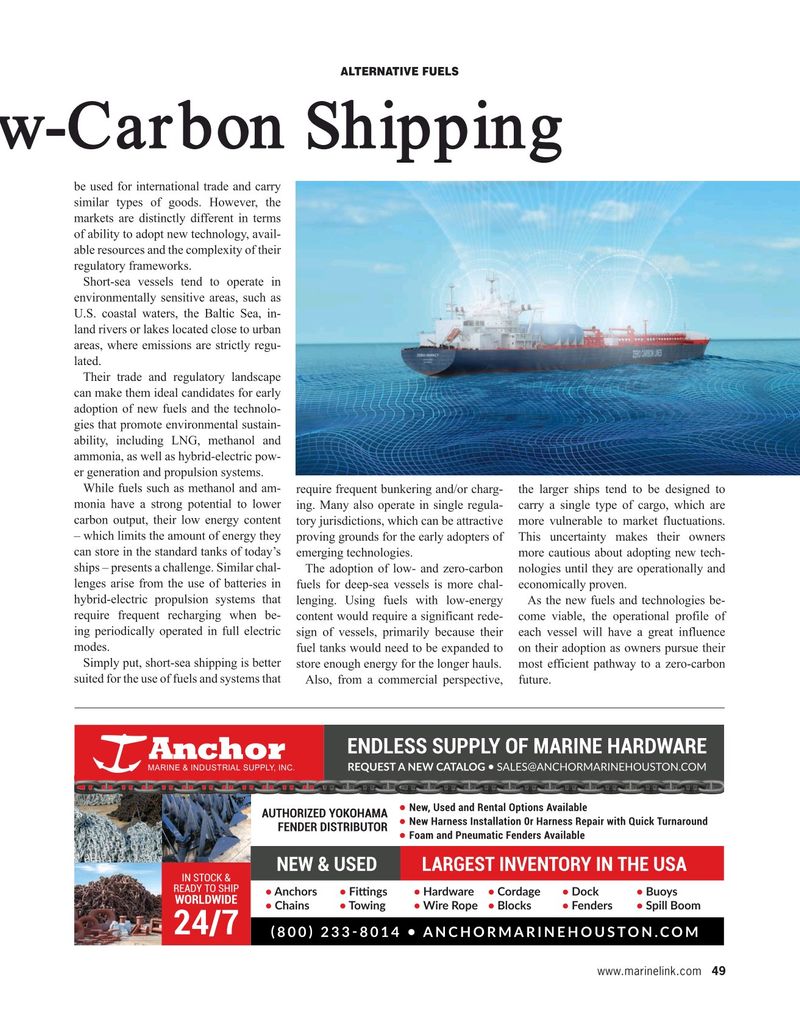
Page 49: of Maritime Reporter Magazine (June 2020)
2020 Yearbook
Read this page in Pdf, Flash or Html5 edition of June 2020 Maritime Reporter Magazine
ALTernATiVe fUeLs
Setting the Course to Low-Carbon Shipping be used for international trade and carry similar types of goods. However, the markets are distinctly different in terms of ability to adopt new technology, avail- able resources and the complexity of their regulatory frameworks.
Short-sea vessels tend to operate in environmentally sensitive areas, such as
U.S. coastal waters, the Baltic Sea, in- land rivers or lakes located close to urban areas, where emissions are strictly regu- lated.
Their trade and regulatory landscape can make them ideal candidates for early adoption of new fuels and the technolo- gies that promote environmental sustain- ability, including LNG, methanol and ammonia, as well as hybrid-electric pow- er generation and propulsion systems.
While fuels such as methanol and am- require frequent bunkering and/or charg- the larger ships tend to be designed to monia have a strong potential to lower ing. Many also operate in single regula- carry a single type of cargo, which are carbon output, their low energy content tory jurisdictions, which can be attractive more vulnerable to market fluctuations. – which limits the amount of energy they proving grounds for the early adopters of This uncertainty makes their owners can store in the standard tanks of today’s emerging technologies. more cautious about adopting new tech- ships – presents a challenge. Similar chal- The adoption of low- and zero-carbon nologies until they are operationally and lenges arise from the use of batteries in fuels for deep-sea vessels is more chal- economically proven. hybrid-electric propulsion systems that lenging. Using fuels with low-energy As the new fuels and technologies be- require frequent recharging when be- content would require a significant rede- come viable, the operational profile of ing periodically operated in full electric sign of vessels, primarily because their each vessel will have a great influence modes. fuel tanks would need to be expanded to on their adoption as owners pursue their
Simply put, short-sea shipping is better store enough energy for the longer hauls. most efficient pathway to a zero-carbon suited for the use of fuels and systems that Also, from a commercial perspective, future.
ENDLESS SUPPLY OF MARINE HARDWARE
REQUEST A NEW CATALOG • [email protected] • New, Used and Rental Options Available
AUTHORIZED YOKOHAMA • New Harness Installation 0r Harness Repair with Quick Turnaround
FENDER DISTRIBUTOR • Foam and Pneumatic Fenders Available
NEW & USED LARGEST INVENTORY IN THE USA
IN STOCK &
READY TO SHIP • Anchors • Fitngs • Hardware • Cordage • Dock • Buoys
WORLDWIDE • Chains • Towing • Wire Rope • Blocks • Fenders • Spill Boom 24/7 (800) 233-8014 • ANCHORMARINEHOUSTON.COM www.marinelink.com 49

 48
48

 50
50
